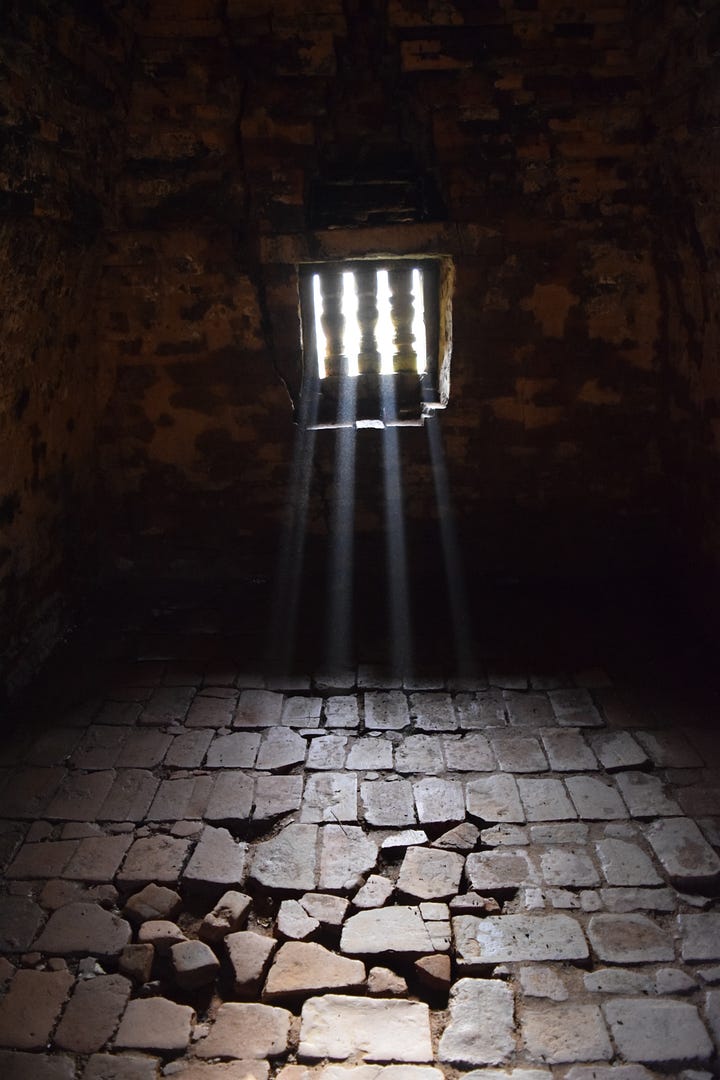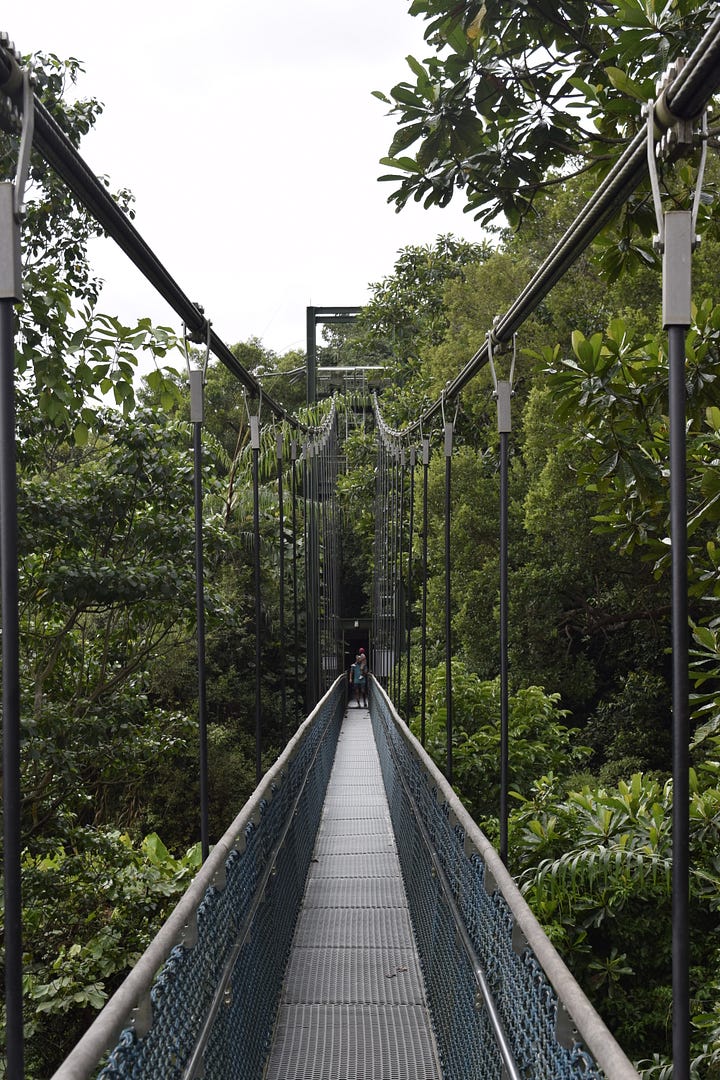

Our post-modern life is often absurd and confounding. We have idealised images of how the world should be, how the road of our lives should proceed. And yet we find ourselves trapped in strange rituals of bureaucracy or raising our voices to yell opinions we don’t really hold.
And what do we do about it? We whittle our life away into trivialities — fulfilling our little pleasures, moving in small circles around fixed points determined by systems we don’t understand. And so we become like tourists during our brief time here on earth — sticking to the main sites, taking the same photos, eating the same meals, walking the same paths. All without any concept of a purpose beyond experiencing the diminishing gratification of these dull offerings.
We numbly recognise the hollowness of this approach to life. How can it be right that we are tourists in our own lives? What an odd way to waste this period of being that we have right now.
Maybe I’m over-generalising when I say we’re all tourists. Because among our population there are a few standouts: travellers and voyagers and wayfarers and even vagabonds. Men and women who seem to be striding through life with a gleam in their eye and a distaste for dead-ends and cheap thrills. They are on the move, for they have somewhere to go. Maybe you’ve met someone like this, or maybe you’re one of them.
It’s good to be part of this shrinking class of people. To be a wanderer and a rambler, a traipser and a seeker. It gets you off the expressways of existence which lead from shopping centre to strip mall and back again, and onto the less explored routes of life. But I would submit that the best approach in life, far beyond tourist or traveller or even a seeker, is to be a tramp and pilgrim.
This post is heavily inspired by Stephen Graham’s 1926 book The Gentle Art of Tramping. Reading it transports you back to an inter-war England where you are taken by the hand of a genteel rambling poet who spends much of his time walking the backroads of glorious Nature, singing its praises. The book opens in this way:
“If you would have a portrait of Man… you cannot show him carrying a rifle, you dare not put him in a priest’s garb… You will not point to King or Bishop with a crown or mitre… most fittingly you will show a man with staff in hand and a burden on his shoulders, straining onward from darkness to light upon an upward road, shading his eyes with his hand as he seeks his way. You will show a figure something like that posthumous picture of Tolstoy, called ‘Tolstoy pilgrimaging toward eternity’.”
Some of the other standout quotes from The Gentle Art of Tramping include:
On the origins of tramping:
“The first tramp left Eden many years ago… it was the only place in which one could feel at home forever and ever. And outside of it one must wander. Life is a wandering and a seeking where it was once a sitting still and an adoring.”
On dealing with people:
“But unless the tramp intends to shun men and women altogether he has to face the problem of liking his fellow man however unlike to himself. It is part of the art of tramping to know how to meet your fellow man, how to greet him, how to know him.”
On the wrong reasons to tramp:
“Good, hard, earnest living - tramping and seeking, will cure most people of the false theatrical. Beware of going to Jerusalem in order that you may come back and tell the world you have been. It spoils all you found on the way.”
On tramping with another person:
“The man you tramp with is not a foreigner… as you may discover before you discover he is kindred. You are thrown into intimate contact with him. Even if the two of you are a couple of egoists strongly self-centred, something is bound to get across in a long tramp. That is one reason why tramping is such a healthful spiritual experience.”
And my personal favourite:
“Tramping is the grammar of living. Few people learn the grammar - but it is worthwhile.”
In the last decade, I haven’t re-read another book quite as much as The Gentle Art of Tramping, probably because it’s short and pithy and illuminates my dreary commute with dreamings of another way of life. But we’re not interested in escapism alone. A dream or a vision or a heavenly desire can be incredibly powerful, but if it’s not pursued it will haunt us.
What Stephen Graham calls ‘tramping’ I see as a kind of applied pilgrimage. Whereas pilgrimages tend to be short spurts with a start and a finish, he speaks of tramping as a way of life. So what Graham calls ‘tramping’ I will call ‘pilgrimage-living’.
Admittedly, pilgrimages tend to carry with them a medieval and ritualistic flavour; something a bit connect-the-dots and paint-by-numbers. But I think in a world soaked in convenience and pleasure, we forget what pilgrimaging used to entail. Pilgrims of centuries past were not signing up for a safe and tidy two-week vacation. They were becoming wanderers who threw in their lot with their fellow pilgrims as well as the souls they would meet on their way, and ultimately, they were relying on the protection of whatever divine mercy had inspired the journey. There wasn’t a lot of planning involved; how could there be without the information resources we take for granted today? And there was something that motivated an ancient pilgrim which is rare today, something like curiosity combined with courage, and a willingness to be dependent on the tides of providence and brotherly love.
So when I say there’s something about pilgrimages as a model for living, I am not speaking in a strictly literal sense. Of course, there is value in following a calling or a heart-stirring or a spirit-leading that takes shape as a traditional pilgrimage. And even broader than that, I have personally experienced the incredible adventure of leaving your regular life behind and taking a leap of faith in response to a spiritual direction. But even most of these times come to an end, in some way or another. I oscillate between marvelling at how adaptable human beings are and then growing disillusioned at our capacity to get comfortable in pretty much any situation. So the answer doesn’t just lie in making the occasional journey. If the best symbol of humanity is the pilgrim seeking a destination, then it must be a mode of living not merely a hiatus from our regular lives. How do we achieve this?
I don’t have a full answer, and besides, this is Waymarkers not Road Maps, so I’m not required to give you every detail of the trail ahead. But let me make my best effort to construct a waymarker that points us down the path of a pilgrimage life, because I have a sneaking suspicion that’s the only path that can take us where we really want to go.
If I had to identify the key aspects of pilgrimage-living which sets it apart from general travel and soulless tourism, and then use those key concepts as the stones to build this waymarker, I think it would look something like this:
seeking Divine guidance
willingness to pursue the unknown
relinquishing comfort
reliance on others
looking beyond self-gratification
Some combination of these things seems to be the correct ingredients. And forgive me if they aren’t all that enticing — I feel the same way! I’m all for Divine guidance, until it leads me somewhere I don’t want to go. Pursuing the unknown feels like an unsolvable riddle because how can I go after something I don’t even know about? And I love being comfortable, I’ll do anything to feel even slightly more comfortable. I don’t like having to rely on other people, it makes me feel like a parasite when I should be self-reliant. And lastly, if this whole pilgrimage-living thing isn’t even going to give me gratification, then what’s the point?
We can dive into this in detail some other time, but for now I’ll just say that if you’re interested in pilgrimage-living, then I think the above list is a good place to start. It points us in the right direction at least.
There is something intrinsic within us all that calls us to roam, to adventure, to throw our fates into the hands of providence and pursue a higher calling. There lies within you a confounding selflessness and a mysterious connection to the natural world and the rest of humanity, even if you aren’t practised in recognising it. And there is also the terrible, inescapable question of whether life — your life — has any purpose. And if it does, how do you discover it? If you’re honest, you can admit you would like it to be less trivial than the self-help gurus would have you believe. And you hope it’s more than a game of navel-gazing and insular self-improvement. I don’t know what your life’s purpose is, but I can guess it’s not all about you and fulfilling your petty desires. Because no human life is intended to be that narrow.
You are intended for greatness, you just don’t understand the meaning of the word ‘great’. You are intended for leaps of faith, for sacrificial love, for transformation and escape from the absurd tedium of this world. You are intended to be loved and to pass on that love, to first be a spiritual child and then become a spiritual parent to another. You are intended to take on the mantle of heroes, those who take daring risks and endure suffering and journeys into the unknown in pursuit of their sacred quest.
More than anything, you are called to be a simple pilgrim; a traveller among brothers and sisters, looking to the stars and following the path toward your destination, happy to ramble and wander and seek and try all for the sake of pursuing the Divine love that first called you.










Thanks John! I'm glad you think it's something you would have found helpful back in the day, as that is my aim when I write here on Waymarkers.
I hope you enjoy the book - it's not everyone's cup of tea, but it's enjoyable even just to be transported back to another era and approach to life!
I think that's right.
"We numbly recognise the hollowness of this approach to life."
I agree. I think one of the most fascinating categories of popular culture is the songs etc. that are (I think) clearly not by Christians or written from a Christian point of view, but which nevertheless poignantly articulate deep Christian insights, such as: the emptiness of modern/postmodern life if we try to live it the world's way, without God; the God-shaped hole in our souls, the aching longing for something more to life that non-Christians, too, are painfully aware of.
"And so we become like tourists during our brief time here on earth . . . ."
And yet, as important as our time here is, ultimately this world is not our home, our truest citizenship is elsewhere; I thought, should we not be "tourists"?
but then you describe
empty tourism vs.
"the pilgrim seeking a destination"
I think that's right.